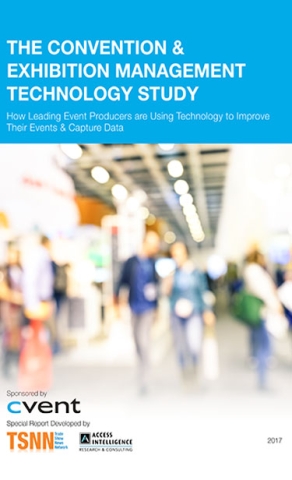TSNN Releases Event Technology Research Report

Face it, the marriage of technology with events has transformed the trade show industry. What began as a great tool to communicate with show audiences has morphed into a powerful partnership that continues to deepen as show producers, managers and organizers realize the incredible benefits of using digital platforms to harness and measure data, market their events, fine-tune their strategy and planning, increase the global reach of their trade shows and conferences and most importantly, interact with audiences and improve attendee experiences.
In an effort to examine this growing phenomenon and provide event professionals with benchmarks and insights on event technology, trends and best practices for using tech to increase the value and efficiency of their shows, TSNN has launched its third in a series of industry research reports: “The Convention & Exhibition Management Technology Study – How Leading Event Producers are Using Technology to Improve Their Events & Capture Data.”
“This TSNN Event Tech Research Report is an incredible resource for trade show organizers and suppliers alike,” said TSNN President and Editor-in-Chief Rachel Wimberly. “All of the information comes directly from some of the largest shows in the industry and highlights what event technology issues and trends are out there.”
Sponsored exclusively by Cvent, this special report was developed by TSNN in partnership with Access Intelligence Consulting.
Download the full report here.
Here are some key findings:
· The term event technology – and similarly “event data” – has different meanings for different event executives and organizations. The top three areas mentioned are apps, event management software and audience engagement.
· Event managers want easier-to-use technology that provides for more effective data analysis and insight.
· Using event data to make better event management decisions; using event data to improve attendance marketing and communications, and capturing more attendee data were the top three most important technology developments and shifts over the past few years, according to event producers who participated in the study.
· For 2017, event management teams are planning to focus on using technology to improve attendance marketing and communications, with exhibitor marketing and management, and data and analytics in a distant second place.
· While 32 percent of respondents said their organization will spend under $50,000 on event technology this year, other spending levels are fairly well-distributed in the higher ranges tracked in the survey.
· On average, event producers expect to spend 10.8 percent more on event technology in 2017 compared to 2016. A significant 77 percent of event producers say their event technology budget has increased in 2017 compared to last year.
Tailored to the needs of convention and exhibition management leaders, TSNN’s Benchmarks and Best Practices Studies for Convention and Exhibition Producers analyze key industry topics including attendance marketing, exhibitor and sponsorship sales practices, detailed event management financials, technology and other key areas, and are designed to provide essential data, metrics, ratios and insights to help show professionals do their jobs with excellence.
Previous TSNN Research Reports include Attendee Marketing & Audience Development Trends, which examines how show producers are driving high-quality, new and repeat attendance, and The Exhibit Sales & Sponsorship Sales best practices studies, which covers how leading convention and exhibition producers are selling more exhibit space and sponsorship opportunities.
Learn more about TSNN Research Reports here.
Download the Cvent-sponsored TSNN Technology report here.
Want to learn even more about event technology? Attend TSNN's Complimentary Webinar: All YOU Need to Know About Event Technology Trends! To register for FREE, go here.


Add new comment